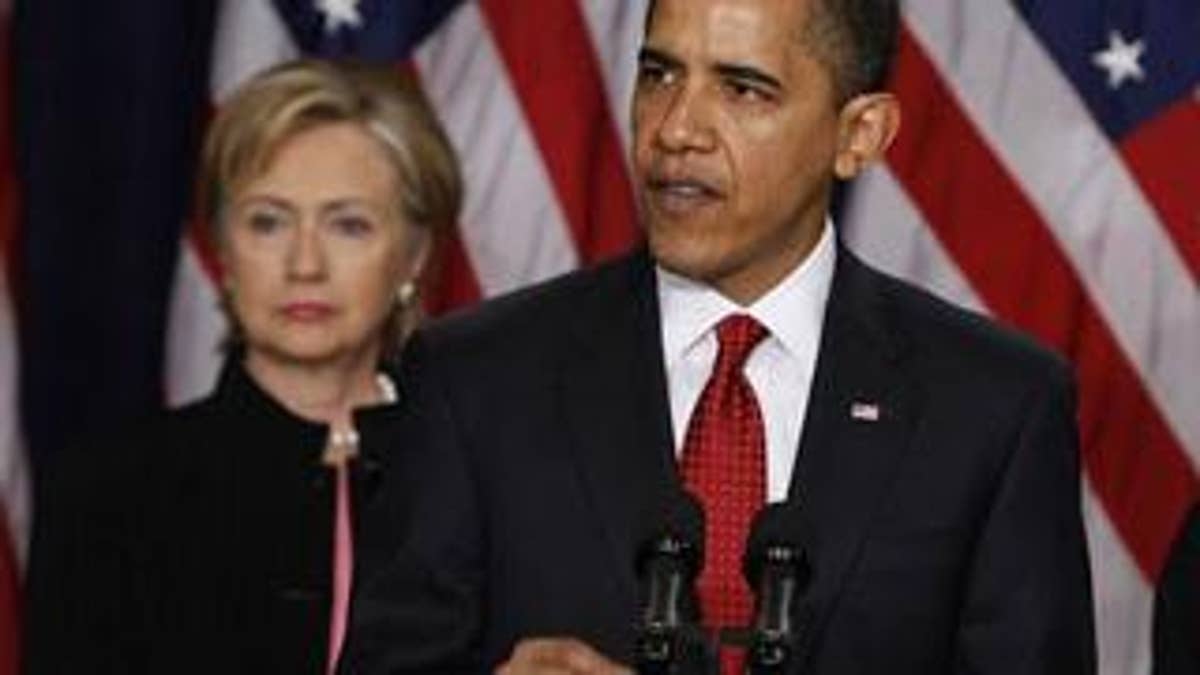
President Obama, declaring that coalition forces must "disrupt, dismantle and defeat" Al Qaeda, called on Friday for thousands of additional U.S. troops and billions of dollars in aid to fight terrorists in Afghanistan and Pakistan.
The president, announcing what he called a "comprehensive new strategy" for the region following a two-month review, outlined an approach to the war that places far more emphasis than before on Pakistan.
Obama said he was ordering 4,000 additional U.S. troops to help train Afghan security forces and was calling on Congress to approve $1.5 billion a year in aid for Pakistan over the next five years.
The increases are aimed at making the security forces, governments and infrastructure of both countries more self-sufficient and stable, as well as capable of taking on Al Qaeda and the Taliban.
Obama warned that the terrorists who plotted the Sept. 11 attacks still reside in both countries, and that intelligence estimates show Al Qaeda is "actively planning" new attacks on the U.S. from safe havens in Pakistan.
"The situation is increasingly perilous," Obama said. "The safety of people around the world is at stake."
Obama said Afghanistan and Pakistan are "inextricably linked" and that extremist elements in both countries must be confronted at once to stabilize the region.
"Al Qaeda and its extremist allies are a cancer that risks killing Pakistan from within," the president said.
Obama bluntly outlined what he saw as the threat Al Qaeda continues to pose to the rest of the world, mentioning "9/11" several times and using the word "terrorists" about a dozen times in the speech.
The 4,000 Army trainers are in addition to the contingent of 17,000 Marines and Army personnel Obama already announced he would deploy for combat and training operations in Afghanistan. Those deployments will start this spring and continue through the summer. The Army trainers will focus their efforts on expanding the ranks and professionalism of the Afghanistan National Army (ANA).
"This strategy is a strategy, it's not a straight-jacket. It's designed to be flexible. We will reassess as we go along," one senior official said during a White House briefing in advance of the president's speech.
Separately, the administration has won an as-yet-unannounced commitment of new forces from France to train the Afghan police forces. Officials said they expected France to announce its moves soon, possibly at NATO meetings next week.
"Ultimately the Afghan national forces need to take the lead in securing their country," one official said.
The Obama administration has set a goal of 134,000 fully trained Afghan Army forces and 82,000 fully trained police forces by the end of 2011. Currently, the Afghan Army has a force of about 75,000, and the number of fully trained Afghan police is less than 40,000.
Obama will also send "hundreds" of civilian State Department and personnel from other U.S. agencies to improve Afghanistan's ability to govern itself -- a tacit acknowledgement that President Hamid Karzai has so far failed to win Obama's full confidence.
Obama said Friday that Afghanistan, despite its elected government, is still undermined by corruption and a persistent drug trade. He called for lawyers, engineers, agriculture specialists and other professionals to help the country "seek the promise of a better future."
The administration also intends to focus new efforts on Pakistan, principally involving regular diplomatic engagement led by special envoy Richard Holbrooke. The U.S. intends to conduct bilateral talks with Pakistan every six-to-eight weeks and U.S.-Pakistan-Afghanistan meetings once every three months.
"That's a fundamental shift," one senior official said, describing the new strategy as one that considers the fight against Al Qaeda and the Taliban a two-nation conflict that requires intensive military and diplomatic efforts. "We recognize Pakistan has a complex, complicated relationship with some of these terrorists groups. Some of these terrorists groups have grown up within the Pakistani system, but many of them have now become Frankensteins which threaten the freedom of Pakistan."
The new strategy will also seek to increase U.S. economic aid to Pakistan's new civilian government. As the president calls for billions in additional funding, Obama will also seek to "increase Pakistan's capabilities against insurgents, terrorists and militants." As an example, one official said, Obama will try to increase Pakistan's "air mobility capability to control their western border."
Increasing Pakistani air power in the West could alleviate the need for U.S. forces to use drones to target Al Qaeda operatives. That could reduce domestic political pressure on the Pakistani government to protest such U.S. air-strikes. Even with these new initiatives, senior officials admitted they are still not completely sure that some elements of Pakistan's military or intelligence services are not aligned with or sympathetic toward Al Qaeda or the Taliban.
The additional Army trainers, when added to the 17,000 already scheduled, will boost U.S. forces by 21,000 this year. That's on top of the roughly 9,000 additional forces former President Bush deployed in late 2008.
That fits with the request submitted by Army Gen. David McKiernan, the U.S. commander in Afghanistan, for a force increase this year, Obama officials said. But it falls short of McKiernan's overall request for 35,000 additional troops in by the end of 2010.
Officials said Obama will decide at a later date whether to meet McKiernan's full troop request.
FOX News' Major Garrett contributed to this report.




